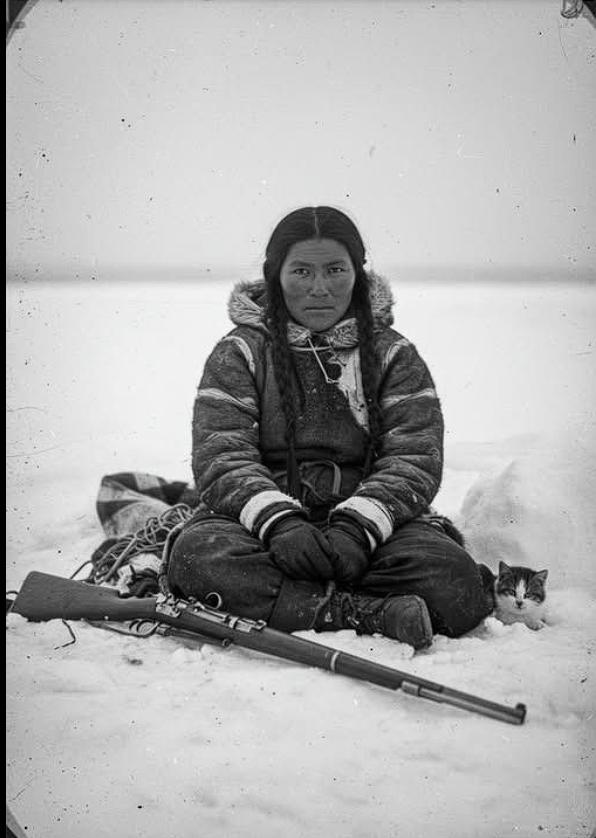In the year 1921, Ada Blackjack, an Inuk woman of remarkable resilience, embarked on a perilous journey, joining a Canadian Arctic expedition under the leadership of the renowned, albeit controversial, explorer Vilhjalmur Stefansson. The ambitious mission aimed to assert Canadian claim over Wrangel Island, a remote and unforgiving expanse of ice and rugged rock situated in the frigid Chukchi Sea. Amidst the expedition team, Ada stood out as the sole woman—and the only Inuk individual—among four white men, a stark illustration of the era’s societal and racial dynamics.
Abandoned in the Arctic: A Solitary Battle for Survival
As the expedition wore on, the already meager food supplies began to dwindle alarmingly. Faced with the grim prospect of starvation, the four men, driven by desperation, made the fateful decision to set off across the treacherous, frozen sea in a desperate attempt to seek assistance. Tragically, they never returned.
Left with a Dying Companion and a Feline Survivor
Ada found herself in an unimaginable predicament, left alone on the desolate island with a dying crewmate and a resilient cat named Vic. The harsh reality soon descended further as her remaining human companion succumbed to the unforgiving conditions, leaving Ada utterly isolated with only the steadfast companionship of the feline. Stranded in the vast, unforgiving Arctic wilderness, hundreds of miles away from any hope of rescue, surrounded by an endless expanse of ice, an oppressive silence, and the ever-present specter of death, Ada faced a seemingly insurmountable challenge.
The Unfamiliar Rifle: A Self-Taught Skill for Survival
In the face of imminent danger, Ada confronted her inexperience head-on. Having never fired a rifle before, a crucial skill for survival in the Arctic, she displayed extraordinary resourcefulness and determination. Through sheer necessity and unwavering will, she taught herself how to operate the firearm, transforming a tool of the unknown into a potential means of defense and sustenance in her desolate surroundings.
Confronting Predators: A Knife Against the Arctic Wild
The unforgiving Arctic landscape presented not only the threat of starvation and exposure but also the terrifying presence of formidable predators. Armed with nothing more than a knife, Ada faced down menacing polar bears, the apex predators of this icy realm. Her courage and tenacity in these terrifying encounters speak volumes about her unwavering will to survive against overwhelming odds.
Resourcefulness in Isolation: Trapping, Sustenance, and Solace
In her solitary struggle, Ada demonstrated remarkable ingenuity and adaptability. She successfully learned to trap foxes, utilizing their fur for warmth and their bodies perhaps for sustenance. She also managed to hunt and consume seal, a vital source of protein and fat in the Arctic environment. To combat the crushing weight of despair and isolation during the long, dark months, Ada found solace in reading the Bible aloud, her voice a fragile echo against the vast silence, a testament to her enduring spirit.
Self-Reliance in the Freeze: Sewing for Survival
As the brutal Arctic winter took its toll, even the simplest necessities became critical for survival. When her fingers began to succumb to the biting frost, Ada, with no one to rely on but herself, painstakingly sewed her own mittens. This act of self-reliance in the face of physical hardship underscores her unwavering determination to endure.
The Comfort of Companionship: Vic’s Purring Warmth
Amidst the overwhelming isolation and relentless challenges, Ada found a small measure of comfort and perhaps even emotional support in the presence of Vic, the cat. Through the long, frozen nights, the resilient feline would curl beside her, its gentle purr a source of warmth, both physical and perhaps emotional, a small reminder of life in the vast emptiness.
Two Years of Endurance: Unbroken in the Frozen Silence
For an astonishing two years, Ada Blackjack endured the brutal realities of her abandonment on Wrangel Island. Alone, facing unimaginable hardships and the constant threat of death, she remained unbroken in spirit, her will to survive a testament to the incredible strength of the human spirit.
Rescue and Remembrance: An Unjustly Forgotten Heroine
When rescuers finally reached the desolate shores of Wrangel Island in 1923, they found Ada Blackjack gaunt and weathered by the harsh elements, but miraculously alive. Yet, upon her return to civilization, the world seemed to quickly forget her extraordinary ordeal and her remarkable survival. The stories of the men who perished filled the headlines, their tragedy becoming the stuff of legend. But Ada Blackjack? She, the sole survivor against all odds, faded into relative obscurity.
A Mother’s Strength: Driven by Love
Beneath the layers of hardship and resilience, Ada Blackjack was a mother, undoubtedly fueled by the primal instinct to return to her child. This fundamental aspect of her identity likely served as an unwavering source of strength and motivation throughout her harrowing ordeal.
A Fearless Fighter: Against Nature and Despair
Ada Blackjack was not merely a survivor; she was a formidable fighter, battling not only the brutal forces of nature – the polar bears, the freezing temperatures, the scarcity of food – but also the insidious grip of despair and isolation. Her two-year ordeal is a testament to her incredible inner strength and unwavering determination.
A True Legend: Her Story Deserves to Be Told
Despite the initial oversight by a world captivated by tragedy, Ada Blackjack’s story is one of extraordinary courage, resilience, and self-reliance. She is a true legend of the Arctic, her survival against seemingly impossible odds a powerful testament to the human spirit. Her name deserves to be remembered and her incredible story finally given the recognition it so richly deserves.
